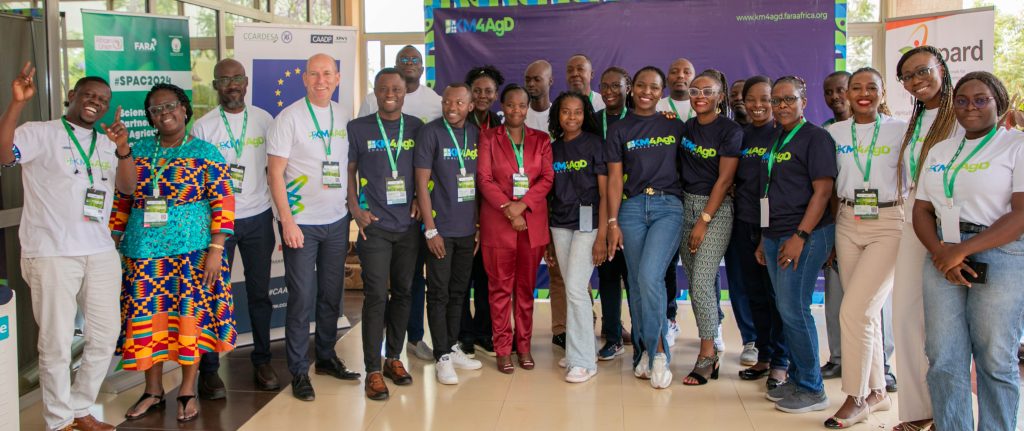By Benjamin Abugri, Shaquille Pennaneach & Mabel Shu
On June 20, 2025, the Knowledge Management for Agricultural Development (KM4AgD) Community of Practice (CoP) held its Bi-Monthly webinar under the theme “Best Practices in Building and Sustaining Effective KM Partnerships.” Organised under the CAADP-XP4 Programme, the session brought together KM professionals, researchers, development partners, and institutional leaders from across Africa and beyond to reflect on how knowledge partnerships can be strengthened to support innovation, learning, and policy engagement in agriculture.
The webinar opened with warm remarks from the moderator, Mabel Lum Shu, who welcomed participants and set the tone for a highly interactive learning experience. She underscored the importance of creating collaborative spaces where practitioners can co-create, share, and reflect on what works in knowledge partnerships. In her words, “the vibrancy of our community depends on how well we listen, adapt, and innovate together.”

One of the session’s highlights was a presentation by Benjamin Abugri, KM, Digitalisation and Learning Lead at the Forum for Agricultural Research in Africa (FARA) and Facilitator of the KM4AgD CoP. Drawing from field experiences and community engagements, Benjamin presented six practical ingredients for building and sustaining successful Communities of Practice. These included: setting clear goals, establishing a learning plan, assigning a moderator or facilitator, using social media and forums for communication, equipping members with collaboration tools, and supporting emerging communities to maintain momentum. He illustrated how these components have been applied within the KM4AgD CoP to strengthen participation and impact. “By nurturing emerging communities,” he noted, “we spread innovation and sustain momentum within our knowledge ecosystem.”

The keynote address was delivered by Krishan Bheenick, a globally respected Knowledge Management consultant. In a deeply reflective and engaging presentation, Krishan traced the evolution of KM in agricultural development from early institutional frameworks to present-day knowledge ecosystems. Using the “KM Tree” model and an ecosystem-based approach, he emphasised the need for strategic alignment, capacity building, and modular planning within KM networks. Krishan encouraged participants to shift from seeing KM as a support service to recognising it as a strategic driver of transformation. He proposed the development of SMART, modular work packages within CoPs that can be celebrated as collective achievements and used to attract new members and partners.
His presentation also introduced the idea of Information, Communication, and Knowledge Management (ICKM) outputs, categorised as communication products, information products, and knowledge products. These, he argued, should be tailored to different levels of stakeholder engagement: global, regional, national, community, and organisational. This approach, rooted in the principle of subsidiarity, allows for more meaningful engagement and storytelling across the agricultural research and development landscape.

The webinar further benefited from insights shared by several eminent guests, including Professor Andreas Brandner, Executive Director of the Knowledge for Development Partnership (K4DP) and Professor Annette Nabatanzi of the Knowledge for Development Centre at Makerere University Business School. Their reflections highlighted both the global relevance and local nuances of KM practice in Africa, emphasising the need for trust-building, shared learning, and institutional ownership.
A significant milestone during the webinar was the launch of the 2025 KM4AgD CoP Survey Report, presented by Bebel Nguepi of YPARD Cameroon. The report captured emerging trends in KM practice, revealing that while the tools and technologies have evolved, core challenges such as engagement, capacity gaps, and institutional integration remain persistent. Upile Faith Muhariwa (Malawi) served as rapporteur for the session, ensuring that the learning points were well documented.
The technical smoothness of the event was made possible through the expert support of Allan Shaquille Pennaneach and Prince Owusu, who handled the digital logistics and participant engagement with professionalism and precision.
In closing, the session reaffirmed the role of KM4AgD as a dynamic platform for collective learning, innovation, and policy influence. As Africa continues to navigate complex development challenges, the importance of well-structured, inclusive, and collaborative KM partnerships cannot be overstated. By drawing on best practices and adapting to context, the KM4AgD CoP continues to offer a blueprint for how knowledge can be mobilised to transform agriculture and livelihoods across the continent. With FARA, CAADP-XP4 partners (CORAF, ASARECA, CCARDESA, AFAAS), INTERFACES and the CGIAR, the CoP remains committed to inclusive, evidence-based, and sustainable KM practices.

Learn more at: km4agd.faraafrica.org
Access Krishan’s Presentation at: https://aaspace.org/items/2d0d2042-39a0-45ee-a81c-19b9eaaaf52f
Join the KM4AgD CoP: https://faraafrica.community/fara-net/km4s3a/km4agd/join






Leave A Comment